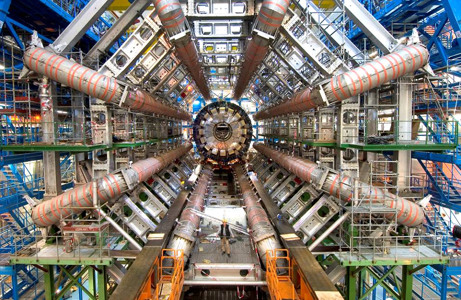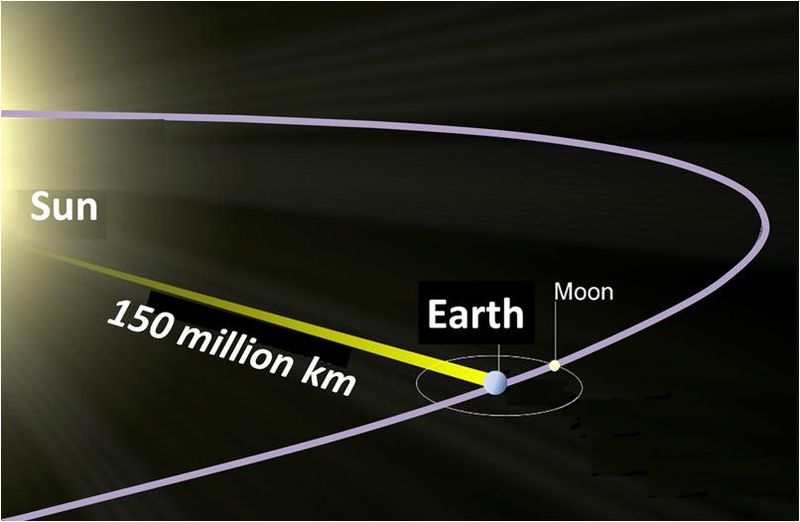Science fiction movies and TV shows often portray time travel with large time machines that send individuals back in time to prevent some catastrophic events from occurring. Now most of us know that time travel is mainly science fiction, and will probably remain that way for the foreseeable future, right? Well the answer is: Not Really.

Due to recent experiments by CERN, it was found that neutrinos travelled faster than the speed of light, a speed in which Albert Einstein defined to be the absolute speed limit of the universe. Now some of you may be wondering what in the world are neutrinos; to put it simply, they are sub atomic particles with very little mass and no electrical charge. What this means is that these particles are extremely difficult to detect, and pass through almost everything without much interaction. However, with CERN’s Super Proton Synchrotron (freakin’ awesome name) just outside Geneva, scientists were able to create neutrinos and then launch them into a cavern over 450 miles away. This experiment, named OPERA (Oscillation Project with Emulsion-tRacking Apparatus) detected that the neutrinos arrived to its destination approximately 60 nanoseconds earlier than expected. 60 nanoseconds seems like a rather short period of time, but is actually a significant difference knowing that light can travel 60 feet in this time frame. Since neutrinos have always been assumed to travel at the speed of light, this experimental result presents a rather troubling problem to the scientific community.

Albert Einstein stated in his special theory of relativity that the speed of light (299,792,458 meters per second) is the fastest speed that can be achieved in the universe. Since photons (fundamental units of light) are massless, they can travel at exactly 299,792,458 meters per second as postulated by Albert Einstein. If the experimental results are proven to be true and not just some systematic error caused by their machinery, this could mean a complete change in the way modern physics is viewed.

Using time travel as an example: If neutrinos could indeed surpass the speed of light, this would imply that these sub atomic particles have the ability to travel backwards in time. In special relativity, it is stated that the faster an object moves, the slower time would influence it. This effect is known as time dilation, and the faster you approach the speed of light, the slower time ticks for you. What does this mean when you exceed the speed of light? That’s right, you start travelling backwards in time. This discovery can lead to the possibility of communicating through time, such as sending signals or messages into the past.

Despite these shocking results, all of this data should be taken with a grain of salt. Although the scientists whom took part in OPERA claim to have high confidence in their results, they are welcoming the broad physics community to replicate their experiment and to attempt to find any mistakes that may have caused this anomaly. We shouldn’t be too quick to overthrow Einstein’s theories just yet, since other experiments in the past have not detected any significant discrepancies between the speed of neutrinos and photons.
It is still very exciting to know that modern physics may have stepped onto a new frontier, and that humans, whom are no more than a speck of dust in the unbelievably large universe, are coming closer and closer to discovering how our reality is truly defined. Or maybe with this discovery, in 50 years Earth will be run by Skynet and evil terminators.


Some of the interviews I’ve been reading say that they might just revise the Theory of Relativity to exclude neutrinos because they were ‘weird’ anyway. Awesome Q+A over here:
http://www.reddit.com/r/askscience/comments/ko638/if_the_particle_discovered_as_cern_is_proven/
“Again, this is very interesting and the experimenters were likely very very careful. Its also interesting (that MINOS/NuMi) seemed to measure the same phenomenon in 2007. However, its a very bold claim that largely invalidates one of our best theories. It also is a difference of only 50 ns. E.g., mismeasure the distance, distances signals propagate by 50 feet and you have your 50ns. (Remember the neutrino beam is traveling 454 miles, so that’s just a difference of 0.002%). Sync the time in your computers incorrectly? Calibrate when the beam left incorrectly, etc. I’m sure they are trying to very carefully control all these things, but its easy to introduce a subtle systematic error somewhere. Also, you have to realize that neutrinos are particularly difficult to detect particles (e.g., a single neutrino will travel through a light-year of lead with a 50% chance of interacting with the lead at some point; and 50% chance of not).”
Here is the paper if anyone is interested:
http://arxiv.org/ftp/arxiv/papers/1109/1109.4897.pdf
/astrophysics nerd
Comments are closed.